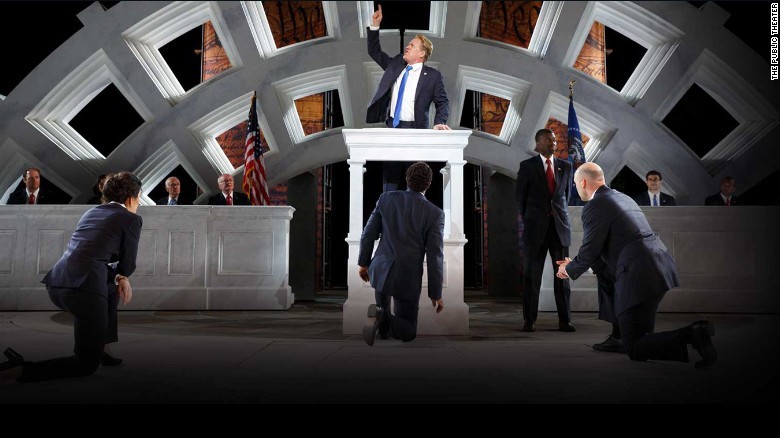
Et tu, Public Theater?
The New York-based arts organization came under fire for staging a production of Shakespeare's "Julius Caesar" starring Trump look-alike Gregg Henry in the titular role. In this staging of play, which was part of the summer's Free Shakespeare in the Park, Caesar is a businessman known for his petulant personality, fancy suits and blondish hair with orange overtones.
His wife, Calpurnia, even has a Slavic accent, much like first lady Melania Trump.
In the play, Roman senators fear Caesar had become power hungry, so they stab him to death.
Delta Air Lines pulled its funding of the theater group on Sunday in response to mounting criticism. Soon after, Bank of America pulled its sponsorship of the play but will retain its funding of the theater.
"No matter what your political stance may be, the graphic staging of 'Julius Caesar' at this summer's Free Shakespeare in the Park does not reflect Delta Air Lines' values," Delta said in a statement Sunday night, as reported by Bloomberg. "Their artistic and creative direction crossed the line on the standards of good taste. We have notified them of our decision to end our sponsorship as the official airline of the Public Theater effective immediately."
Bank of America, meanwhile, said in a statement that it, too, was "withdrawing our funding for this production."
The Public Theater chose to present Julius Caesar in such a way that was intended to provoke and offend. Had this intention been made known to us, we would have decided not to sponsor it.
The play will open Monday at The Delacorte Theater in Central Park, but early previews immediately stirred up intense controversy, even though Trump's name is never mentioned in the production.
The play "takes onstage Trump-trolling to a startling new level," said a New York Times review.
Neither the play's director, Oskar Eustis, nor the Public Theater responded to The Washington Post's calls for comment by deadline.
Laura Sheaffer, a longtime fan of Shakespeare in the Park, attended a preview and became one of the first to describe the assassination scene.
"The actor playing Caesar was dressed in a business suit, with a royal blue tie, hanging a couple inches below the belt line, with reddish-blonde hair - just like Trump," Sheaffer told Mediaite. "To be honest I thought it was shocking and distasteful. If this had happened to any other president - even as recently as Barack Obama or George W. Bush - it would not have flown. People would have been horrified."
"I mean it was the on-stage murder of the president of the United States," she added.
Others on Twitter agreed.
Soon after, the conservative Breitbart News published a story headlined, "'Trump' Stabbed to Death in Central Park Performance of 'Julius Caesar.'"
The controversy spread nationally Sunday after Trump's son Donald Trump, Jr., retweeted a story from Fox News stating, "A New York City play appears to depict President Trump being brutally stabbed to death by women and minorities."
In the retweet, Trump, Jr. said, "I wonder how much of this 'art' is funded by taxpayers. Serious question, when does 'art' become political speech & does that change things?"
His tweet was "liked" more than 11,000 times and retweeted more than 4,500 times as of early Monday morning.
In Shakespeare's play - the one that many teens read in high school English classes - the senators assassinated Caesar because they feared he had become too powerful and sought absolute power of Rome, a Republic. The act, though, was not a triumphant one. Instead, it proved catastrophic for Rome.
Henry, the actor who portrayed Caesar and previously played a Trump surrogate on "Scandal," argued the play contained parallels to today's political environment.
He told Backstage that the director's "vision of the show is very much to show us a warning that Shakespeare had as well that when a tyrant comes to power and the way you fight that tyrant, it's very important how you then try to deal with the problem because if you don't deal with the problem in a proper way, you can end up losing democracy for like, 2000 years."
Caesar "became drunk with ego, drunk with power, drunk with ambition and the belief that he and he alone must rule the world," he continued, adding, "The idea for me was to try and . . . show you that this could be Trump."
The director seemed to agree.
"Julius Caesar can be read as a warning parable to those who try to fight for democracy by undemocratic means. To fight the tyrant does not mean imitating him," Eustis said in a note on the Public Theater's website.
He stressed "anyone seeing our production of 'Julius Caesar' will realize it in no way advocates violence towards anyone," in a statement to the Associated Press.
Instead, he said his production makes "the opposite point: Those who attempt to defend democracy by undemocratic methods pay a terrible price and destroy their Republic. For over 400 years, Shakespeare's play has told this story and we are proud to be telling it again in Central Park."
New York Times reviewer Jesse Green mirrored this thought, writing in a review:
Even a cursory reading of the play, the kind that many American teenagers give it in high school, is enough to show that it does not advocate assassination. Shakespeare portrays the killing of Caesar by seven of his fellow senators as an unmitigated disaster for Rome, no matter how patriotic the intentions.
The Delacorte production, vividly staged by the Public's artistic director, Oskar Eustis, bears the same message.


 Contact The Editor
Contact The Editor
 Articles By This Author
Articles By This Author